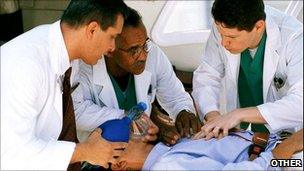Untrained urged to use chest compressions, not full CPR
- Published

An estimated 30,000 people each year in the UK have cardiac arrests in public
Experts are warning members of the public against giving mouth-to-mouth resuscitation unless they have been fully trained.
New guidelines say that those lacking the necessary skills should perform chest compressions only.
This offers the best chance of saving a life when helping in a crisis, the guidelines say.
But if a bystander is fully trained, then full CPR with the "kiss of life" remains the best option.
Cardio-Pulmonary Resuscitation (CPR) involves chest compressions and "rescue" breaths, with the aim of restarting the heart.
Medical charities urge people to learn full CPR and first aid.
But the 2010 Resuscitation Guidelines say untrained members of the public should attempt no more than chest compressions if they find themselves confronted by an emergency.
The first action should be dialling 999, followed by compression-only CPR or full CPR if a person is trained, the guidelines say.
Meng Aw-Yong, medical adviser at St John Ambulance, said: "Every year thousands of people die of cardiac arrest when first aid could have helped them live.
"These changes are effectively saying that people who are untrained should have a go at doing chest compressions because something is better than nothing and they could be buying time for someone who desperately needs it."
Experts found that many people were reluctant to give mouth-to-mouth resuscitation.
Some were unwilling to "kiss" a stranger, while others were concerned about getting the technique wrong.
According to the document, every opportunity should be taken to give compression-only CPR because "any CPR is better than no CPR".
Jasmeet Soar, chair of Resuscitation Council (UK), said: "Most cardiac arrests happen outside hospital, so it is vital that as many people as possible can do CPR."
Chest compressions should be carried out at a depth of 5cm to 6cm, at a rate of 100 to 120 compressions per minute.
This differs to previous guidelines, which recommended more shallow compressions and a rate of 100 per minute.
An estimated 30,000 people each year in the UK suffer cardiac arrests in public.
But fewer than one in 10 survive - and only around a third receive CPR from a bystander.
Studies have shown that a bystander performing CPR can double the chances of the victim living.
US research published last week warned against giving mouth to mouth, saying it interrupts time that is better spent on chest compressions.
- Published15 October 2010